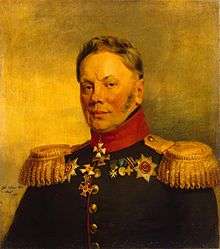Ilya Duka
Baron Ilya Mikhailovich Duka (Russian: Илья Михайлович Дука; 1768–28 February 1830) was a Russian general in the Napoleonic Wars.
Ilya Mikhailovich Duka | |
|---|---|
 | |
| Born | 1768 Aachen, Holy Roman Empire |
| Died | February 28, 1830 Ivnya, Kursk Governorate, Imperial Russia |
| Allegiance | |
| Service/ | Army |
| Years of service | 1776–1827 |
| Rank | General of the Cavalry |
| Wars | Russo-Turkish War (1787–1792) War of the Fourth Coalition |
| Awards | Order of St. George Order of the Red Eagle Order of Leopold Order of St. Vladimir Gold Sword for Bravery Order of Saint Anna |
Biography
Ilya Mikhailovich Duka came from a Serbian family that emigrated to Russia, established in the Kursk Governorate. In May 1776, he joined the infantry at Shlisselburg (formerly Nöteborg) near St. Petersburg. In 1783 he fought against Polish confederates alongside the Russian Imperial Army and was promoted to aide-de-camp to Major-General Ivan Šević, the grandson of Jovan Šević.[2]
He participated in the Russo-Turkish campaign in 1788-89 and was transferred to the Ostrogozh Light Cavalry Regiment in 1790. During the campaign in Poland in 1794, he distinguished himself by capturing General Tomasz Wawrzecki and his officers, and was promoted to major. In October 1799, he was transferred to the Life Guard Hussar Regiment and promoted to colonel. On 23 October 1806, Duka was appointed chef of the Little Russia Cuirassier Regiment. He took part in the 1807 Campaign and distinguished himself at Eylau, being awarded the Order of St. George (3rd Class) and a Golden Weapon "For Bravery". He was promoted to major general on 6 June 1807. In 1812, Duka commanded the 2nd Brigade of the 2nd Cuirassier Division,[3] and later commanded the division itself. For his actions at Smolensk and Borodino, Duka was awarded the Order of St. Anna (1st Class) and for the battles of Tarutino and Maloyaroslavets—the Order of St. Vladimir (2nd Class). In 1813, Duka was promoted to lieutenant general (27 September), fought at Leipzig and was wounded in the head. In 1814 he participated in the capture of Paris.[4] He was awarded the Prussian Order of the Red Eagle and the Austrian Order of St. Leopold.[5] Upon his return to Russia, Duka commanded the 2nd Cuirassier Division and in September 1823, he was appointed to command the 2nd Reserve Cavalry Corps. In September 1826, he was promoted to the general of cavalry, the next highest rank to Field marshal, and then retired on 17 February 1827 because of ill health.[6] He died on 28 February 1830.
See also
- Peter Mikhailovich Kaptzevich
- Peter Ivanovich Ivelich
- Ivan Shevich
- Andrei Miloradovich
- Avram Ratkov
- Ivan Adamovich
- Nikolay Bogdanov
- Nikolay Depreradovich
- Ivan Lukačević (soldier)
- Jovan Šević
- Jovan Albanez
- Simeon Piščević
- Anto Gvozdenović
- Mikhail Miloradovich
- Semyon Zorich
- Peter Tekeli
- Georgi Emmanuel
- Dejan Subotić
- Fedor Yakovlevich Mirkovich
- Marko Ivelich
- Rajko Depreradović
References
- Translated and adapted from French Wikipedia: fr:Ilya Mikhaïlovitch Douka
- The State Hermitage. Western European painting. Catalog. 2nd Volume
- Vanče Stojčev, Military History of Macedonia, Éditeur Military Academy "General Mihailo Apostolski", 2004 ISBN 9989134057, ISBN 9789989134050
- Croft, Lee B. (Sep 15, 2012). George Anton Schaeffer: Killing Napoleon From The Air, Volume 1. BookBaby. ISBN 0985890894. Retrieved 23 January 2019.
- Leggiere, Michael V. (Nov 12, 2007). The Fall of Napoleon: Volume 1, The Allied Invasion of France, 1813-1814. Cambridge University Press. p. 505. ISBN 0521875420. Retrieved 23 January 2019.
- Michael V. Leggiere, The Fall of Napoleon, Volume 1, Cambridge University Press, 2007, p. 515 ISBN 0-521-87542-0, ISBN 9780521875424
- Vanče Stojčev, Military History of Macedonia, Military Academy "General Mihailo Apostolski", 2004 ISBN 9989134057, ISBN 9789989134050